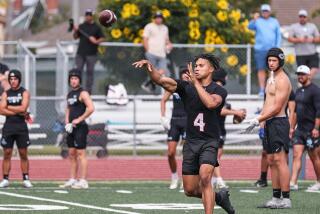High Life: A WEEKLY FORUM FOR HIGH SCHOOL STUDENTS : Decided Study in Conflicts : Scheduling: There are only so many hours in a day, which for some students means making serious choices.
- Share via
The Fullerton High School principal entered the room and closed the door behind him. I tried to look optimistic, even though I knew my mission was impossible.
*
School hadn’t started yet, and I was already in the principal’s office.
“Good morning,” he said. “How was your summer?” I told him. Then I got to the point.
A shift that had been made in class schedules would create a conflict for students who wanted to enroll in the school’s journalism program, I said.
Then I tried to play principal.
Why don’t we move this class to this period, have this teacher teach this class, and, well (this was getting good), hire a new teacher?
He did the inevitable. He laughed.
*
Schedule conflicts. There’s often no way around them. The time comes when, as they say, you have to finally decide, say yes to one and let the other one ride.
The impact of conflicts can make itself felt in ways beyond the individual, though.
Just as some TV programs succeed in the ratings game only because they have no stiff competition and others wilt because they are in the same time slot as a popular show, so it goes with high school classes. Scheduling sometimes harms a program, sometimes boosts it.
When two honors classes occur during the same period as an elective, for example, many top students feel they have no choice but to take the academic path. The result is that elective classes--such as journalism and fine arts--lose the talents of these students.
Schools do the best they can to avoid conflicts. Administrators take hours to formulate a master schedule to eliminate a great number of them. But no schedule is conflict-free.
There are so many classes. And so little time.
Each school has developed its own system for registration and class scheduling. At Huntington Beach High, for example, students do not find out about conflicts until they get their class schedules. Fullerton High notifies all students with conflicts weeks before classes begin.
At Fullerton, the problem lies in the large number of “singletons”--classes that are taught only during one period. In Advanced Placement, International Baccalaureate and other honors programs, students take rigorous course loads that can take up every period of the day. (Last year I signed up for seven classes--all singletons. Because two of the classes were held during the same period, I took one class at Cal State Fullerton, twice a week, at night.)
“Eventually there’s a small percentage (of students) that have to make a choice,” said Dan Harrington, dean of students at El Dorado High in Placentia. “And it’s not always a pleasant choice. But usually it’s only a few.”
The few are often the honors students.
*
El Dorado has managed to minimize the conflicts by offering at least two periods of each honors class. That would have solved Travis Westfall’s problems last year. Travis, 17, a senior at Troy High School in Fullerton, was enrolled in honors physics, French II and journalism, all scheduled for the same period. To solve the problem, Travis attended physics during fifth period; he made special arrangements with the journalism teacher for a sixth period session and three days a week, his French teacher stayed after school to teach him one on one.
“I was very busy,” he said. “I didn’t leave school until 4:30, and I got there at 7:15. Teachers are pretty helpful as long as you’re trying.”
That’s more than just pretty helpful. That’s very helpful. And Travis didn’t even have to play principal.
More to Read
Sign up for Essential California
The most important California stories and recommendations in your inbox every morning.
You may occasionally receive promotional content from the Los Angeles Times.













